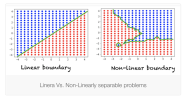Can you elaborate then? What else do you mean by "fundamentally down at the lower levels"?
Circling back to my original response to "AI is just a series of IF/THEN statements", which can be true for non-generative AI (like a chess bot or video game NPC) but is certainly not used for construction of LLMs.
Here is an example of how it can be done using Python. It uses mathematical functions that are higher than my pay grade. Even if you are somehow able to logically define the activation of each node using IF/THEN statements, explaining away the entire process like the original post I replied to is like answering the question of "how do airplanes fly" by saying "it's just a bunch of pistons going up and down".



